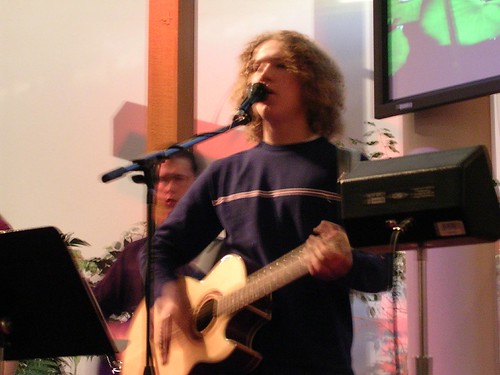My friend WT (now back home in New York) mentioned a street production that he saw a while back, I believe on the Royal Mile in Edinburgh. He said that there were a number of actors, all speaking different languages and coming from different countries. Though he could not understand a word that was spoken, he said it was one of the most powerful emotional moments in his life. He laughed, cried, and experienced the whole range of human emotion in one linguistically indecipherable show.
One thing I’ve been pleased to do in Sitka is associate with all different artistic types. Every day I work with actors, musicians, painters, animators, filmmakers, dancers and writers. I myself have no artistic experiences except those interpreted through the lens of musicianship. Therefore, it has been surprising and informative to view the emotional responses of these different artists to presentations of art in all its different forms.
Through my observation, I notice quite a bit of cross-disciplinary appreciation. When I say “appreciate,” I add a depth to the word that is infrequently associated. I don’t just mean the musician who goes to the ballet; I mean the musician who finds inner peace at the ballet. I mean the actor who is moved to tears by a piece of visual art constructed of latex gloves, plaster, and oil paint on canvas; the improv artist who lives for orchestral music; the ceramics worker who cries during a basketball documentary.
I don’t have such a deep appreciation for other arts. I have the beginnings of such an appreciation for my own art. I laugh at musical jokes and groove to great jazz. However, I recall only two times when I’ve actually cried because of music. The first was listening to Eric Whitacre’s “October” in tenth grade. The second was while writing a song for my sister during my sophomore year of college. Critics have noted that during the 1937 premiere of Dmitri Shostakovich’s Symphony No. 5, there was open weeping during the slow movement and a half-hour ovation at the end. Imagine listening to the Seattle Symphony perform and being shaken so much that it didn’t bother you to cry out loud. Or imagine standing for 30 full minutes at the end of a performance and rejoicing in its subtle undertones. Even more, imagine a hall full of 10,000 people together understanding and feeling a musical message.
The Fifth Symphony’s premiere came during the Great Terror, when fear and hatred of the Soviet government’s oppression and murder could not be expressed through spoken means. Shostakovich, maybe more than any other composer, was a composer of the people, because he suffered as the people did in his defiance of Soviet rule. In researching him for a paper two years ago, I learned that Shostakovich used to sleep on the street below his home at night in order to prevent his expected arrest from disturbing his wife and children. Stalin targeted Shostakovich and used him as an example to the people due to his wild popularity. Shostakovich’s oppression by the establishment clearly shaped his art. His extremely progressive 4th Symphony was not allowed a premiere until 20 years after its composition. His comparatively more conservative 5th Symphony was loved by the Politburo for its return to traditional symphonic forms, scoring, and harmonic language; yet the same symphony was loved by the people for its inherent expressions of sorrow and its insistently victorious Finale. Though I don’t feel these expressions the same way the people of the Soviet Union did in 1937, I can at least understand them through the medium of music. When Shostakovich scores a high violin drone with a rhythmically steady harp solo in minor, I can feel the haunting song of the People reluctantly plodding on through persecution. If Rembrandt were to depict a similar idea, I would see only a man in a black coat.
I know the reason people love art: it speaks to the core of those issues which language alone cannot resolve. I have a deep need to be exposed to more art. Right now, I don’t understand the language that other art forms are speaking.
Subscribe to:
Post Comments (Atom)

No comments:
Post a Comment